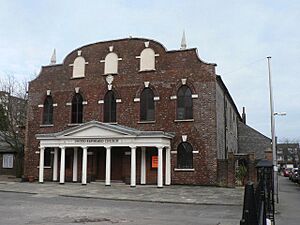Poole United Reformed Church facts for kids
The Skinner Street United Reformed Church is a very old church located in Poole, Dorset, England. It is the oldest church in Poole that is still standing today. The building you see now was built a long time ago, in the 1700s, and it's the only church from that century left in Poole. It's considered a very important historical building, which means it's protected because of its special design and history. Inside the church, there is a grave for Cyril Coles, who was a soldier involved in the first-ever tank attack during a war in 1916. Today, the church is also used as a place where adults can go to learn new skills and subjects.
A Long History
The very first church building on this spot, which was a small chapel, was built in 1662. This makes it the oldest church in Poole that is still around. A year later, in 1663, a man named John Wesley's grandfather became the first minister of this chapel.
The church moved into a new building in 1760. The beautiful building you see today, which has a style called Georgian, was built in 1777. It cost about £1,440 to build back then. This makes it the only church building from the 1700s still standing in Poole.
Changes Over Time
Over the years, the church building has been updated. In 1814, a room called a vestry was added. Then, in 1823, the main part of the church was made bigger. New balconies, called galleries, were put in, and this cost around £2,000. Later, in 1886, the roof of the church was changed.
In the 1800s, a lot of people attended this church, more than 1,000! Because so many people were part of the church, some groups of people from this church started new United Reformed Churches in other places, even as far away as Newfoundland.
Protecting the Building
In 1954, the church building, along with its wall and railings on the north-east side, was officially recognized as a very important historical building. This means it's protected so it can be preserved for many more years.
More recently, in 2014, the church received a grant of £5,000 from a group called the Dorset Historic Churches Trust. This money helped them pay for important repairs to the roof. In 2015, the church also helped people in need by offering free dental care and flu shots to homeless people.
In 2021, a special blue plaque was placed at the church. This plaque honors Philip Henry Gosse, a famous naturalist who studied nature.
 | Charles R. Drew |
 | Benjamin Banneker |
 | Jane C. Wright |
 | Roger Arliner Young |


